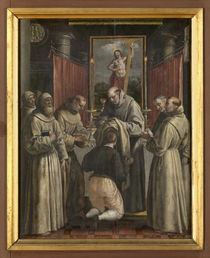The Catholic Defender: Saint Romuald
- Donald Hartley

- Jun 19
- 3 min read
Updated: Jun 20
Deepertruth with special permission and aid with Franiciscan Media, a great team for the Lord

In the midst of a wasted youth, Romuald watched his father kill a relative in a duel over property. In horror he fled to a monastery near Ravenna. After three years, some of the monks found him to be uncomfortably holy and eased him out.
As a youth, according to early accounts, Romuald indulged in the pleasures and sins of the world common to a tenth-century nobleman. At the age of twenty he served as second to his father, who killed a relative in a duel over property. Romuald was devastated and went to the Basilica of Sant'Apollinare in Classe to do 40 days of penance.
Romuald spent the next 30 years going about Italy, founding monasteries and hermitages. He longed to give his life to Christ in martyrdom, and got the pope’s permission to preach the gospel in Hungary. But he was struck with illness as soon as he arrived, and the illness recurred as often as he tried to proceed.
Romuald (Latin: Romualdus; c. 951 – traditionally 19 June, c. 1025/27 AD) was the founder of the Camaldolese order and a major figure in the eleventh century "Renaissance of eremitical asceticism". Romuald spent about 30 years traversing Italy, founding and reforming monasteries and hermitages.
During another period of his life, Romuald suffered great spiritual dryness. One day as he was praying Psalm 31 (“I will give you understanding and I will instruct you”), he was given an extraordinary light and spirit which never left him.
At the next monastery where he stayed, Romuald was accused of a scandalous crime by a young nobleman he had rebuked for a dissolute life. Amazingly, his fellow monks believed the accusation. He was given a severe penance, forbidden from offering Mass, and excommunicated—an unjust sentence that he endured in silence for six months.
The most famous of the monasteries Romuald founded was that of the Camaldoli in Tuscany. Here began the Order of the Camaldolese Benedictines, uniting the monastic and eremitical lives. In later life Romuald’s own father became a monk, wavered, and was kept faithful by the encouragement of his son.
St. Romuald of Ravenna, Italian San Romualdo Di Ravenna, (born c. 950, Ravenna [Italy]—died June 19, 1027, Val di Castro, Tuscany; feast day June 19), Christian ascetic who founded the Camaldolese Benedictines (Hermits). His feast day is celebrated on June 19, the anniversary of his death.
Romuald's approach to the contemplative life, reminiscent of the early Desert Fathers, can be seen in the short piece of writing known as his “Brief Rule.” It reads as follows: “Sit in your cell as in paradise. Put the whole world behind you and forget it. Watch your thoughts like a good fisherman watching for fish.
Romuald's feast day was not included in the Tridentine Calendar. It was added in 1594 for celebration on 19 June, the date of his death, but in the following year it was transferred by Pope Clement VIII to 7 February, the anniversary of the transfer of his relics to Fabriano in 1481, and in 1969 it was moved back to the day of his death.
In the beginning of his spiritual life he was strongly assailed by numerous temptations, which he conquered by vigilance and prayer. More than one attempt was made on his life, but Divine Providence enabled him to escape from the danger. Like many servants of God, he also became the victim of calumny, which he bore in patience and silence. In his old age, he increased his austerities instead of diminishing them. After a long life of merit, he died in the monastery of Castro, which he founded in Marquisate of Ancona. His death occurred on June 19, about the year 1027. His feast day is June 19th.
Christ is a gentle leader, but he calls us to total holiness. Now and then, men and women are raised up to challenge us by the absoluteness of their dedication, the vigor of their spirit, the depth of their conversion. The fact that we cannot duplicate their lives does not change the call to us to be totally open to God in our own particular circumstances.





















Comments